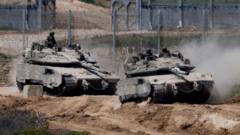Israel's military operations against Hamas are set to escalate as the security cabinet approved a comprehensive plan aimed at increasing pressure on the group. The decision comes after a two-month ceasefire was lifted. Tens of thousands of reservists are being mobilized to aid in this effort, which includes occupying portions of Gaza and reshaping the area into a buffer zone between Gaza and Israel, and Egypt.
The Israeli government is shifting from tactical raids to a more sustained ground presence in Gaza, according to Prime Minister Benjamin Netanyahu. Israeli media reports that the cabinet's unanimous approval signals a broader strategy to not only combat Hamas but also negotiate terms for hostages held by the militant group. Netanyahu emphasized that the new plan marks a significant shift in Israel's military approach.
However, humanitarian organizations have raised alarms about the potential risks of these military plans. Accusations have surfaced regarding the blockade that has led to serious shortages of food and medical supplies in Gaza, exacerbated by the Israeli government’s proposals which critics outline to potentially violate fundamental humanitarian principles.
The UN and other agencies have rebuffed plans for aid delivery through private entities, owing to fears it could reinforce Israeli control over essential supplies and endanger vulnerable populations. The Humanitarian Country Team indicated that the operation might force citizens into dangerous military zones in search of resources, posing risks not only to the displaced populace but also to humanitarian workers.
Since the outset of renewed hostilities following an unprecedented cross-border attack on October 7, 2023, the region has witnessed dire consequences, including significant loss of life, with recent reports indicating over 52,000 fatalities in Gaza. As the situation evolves, the international community continues to monitor Israel's compliance with humanitarian obligations amidst ongoing conflict.






















